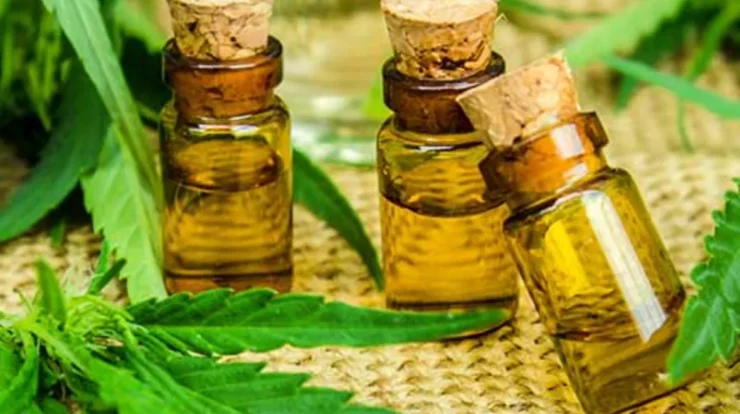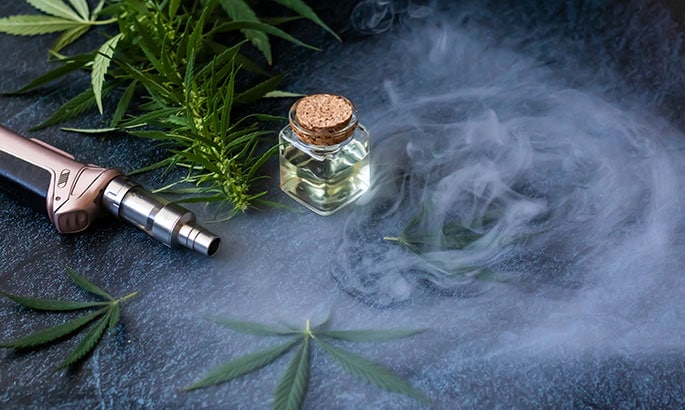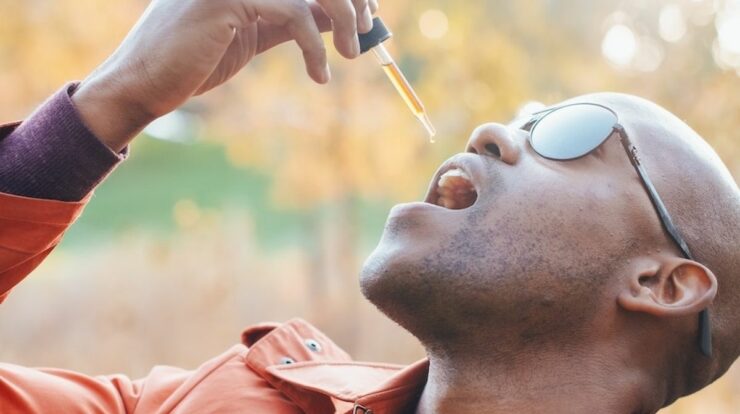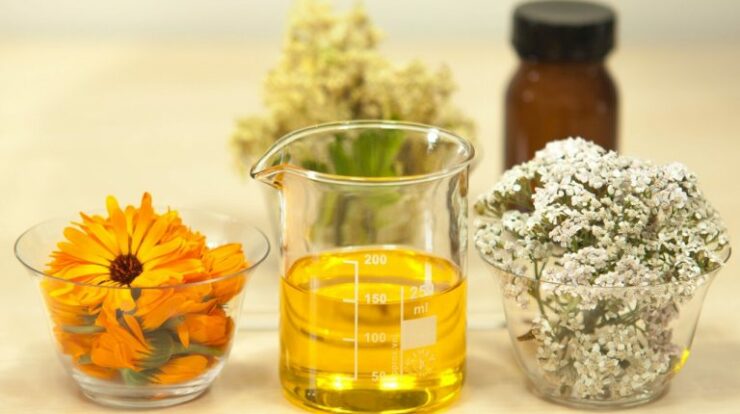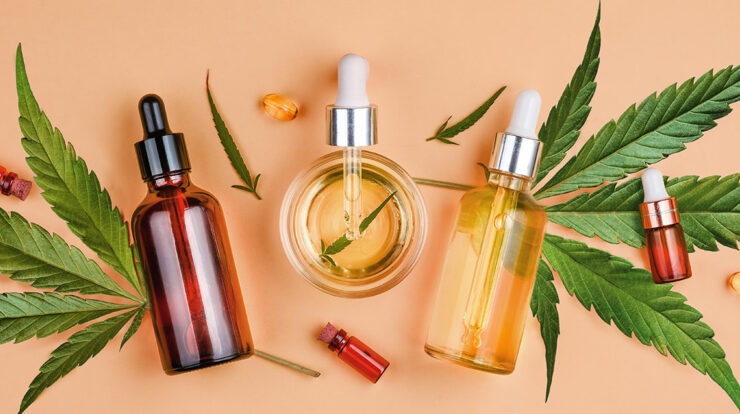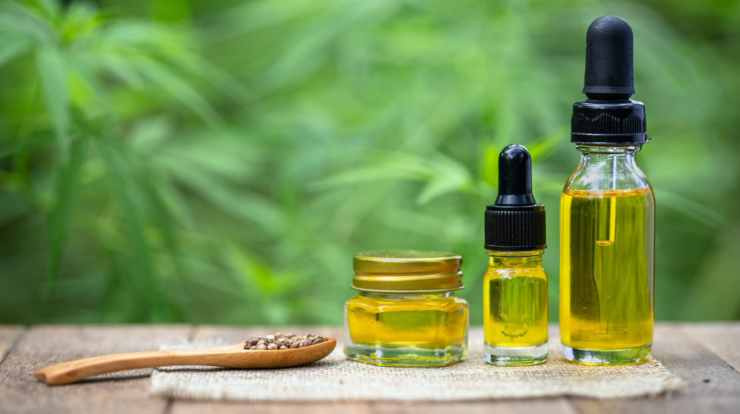
Cannabidiol, or CBD for short, is a phyto-cannabinoid found in cannabis plants. However, it does not cause the same psychoactive effects as other naturally occurring cannabinoids (such as tetrahydrocannabinol, or THC). Research is limited outside of showing that CBD is an anti-inflamatory but CBD users have reported benefits ranging from insomnia to anxiety relief. Legality is an issue for some; all 50 states have laws governing the sale, possession, and use of CBD, and they vary significantly (see the table below for a full analysis).
The extract known as CBD oil sold in the U.S. falls into one of two categories. Crystalline isolate exclusively contains CBD, as other cannabinoids have been removed; full spectrum oil, on the other hand, retains THC and other cannabinoids, and is only sold in states where marijuana use has been legalized.
CBD oil can be consumed several different ways, including ingested capsules and food products, vaporizing, tinctures, and topical creams. The soporific effects of CBD oil are linked to its concentration; low-concentration oils will produce minimal effects, while high-concentration oils will produce strong effects.
This guide will discuss the benefits of CBD oil for people with insomnia and other sleep disorders. Below you will find our picks for the top seven brands selling CBD oils today. Our choices are based on verified customer and owner experiences, as well as intensive product research and analysis.
The Best CBD Oils – Reviewed
1. Editor’s Pick Broad Spectrum – Medterra
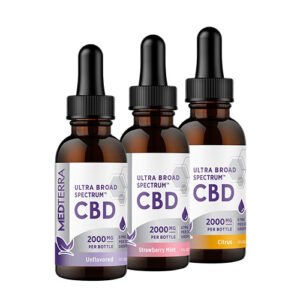
Editor’s Pick Broad Spectrum Overview
Broad spectrum CBD oils provide the benefits of a range of cannabanoids without the inclusion of THC. Our editor’s pick for this category is the Medterra CBD Oil Tincture, which contains CBD in addition to other beneficial, hemp-derived compounds including CBG, CBN, CBC, CBDV, and natural terpenes . The oil is extracted from hemp plants that are free of GMOs and pesticides, as well. All third-party testing results for the oil are accessible through Medterra’s official product page.
The tincture is available in two strengths (1,000mg and 2,000mg) and three flavors (Citrus available now, Strawberry Mint and Unflavored coming soon). Prices range from $0.05 to $0.06 per mg, depending on the concentration, which makes the tincture very low-priced compared to oils from most competing brands. Medterra also offers a 30-day satisfaction guarantee and will issue full refunds for all returns. In addition to the tincture, Medterra also offers CBD capsules in 25mg and 50mg concentrations.
2. Editor’s Pick Full Spectrum – NuLeaf Naturals
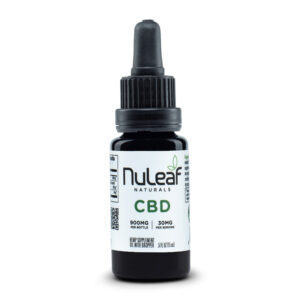
Editor’s Pick Full Spectrum Overview
Since 2014, NuLeaf Naturals – our Editor’s Pick for full spectrum THC – has been committed to creating high-quality CBD oil products. As one of the oldest and most reviewed companies in the industry, NuLeaf Naturals has established themselves as a trustworthy CBD manufacturer. All of their products are tested by third party labs and their cannabinoid profile is impressive. They offer a unique range of concentrations for their organic CBD products ranging from 240mg to 4,850mg.
NuLeaf Naturals CBD oil tinctures are all full spectrum; it is 100% organic and never made with herbicides, pesticides, or chemical fertilizers. The brand offers a full spectrum pet CBD oil tincture, as well. NuLeaf Naturals offers free shipping to all 50 states; the brand’s products are also sold in more than 1,000 retail locations across the country.
3. Highest Potency – Sabaidee
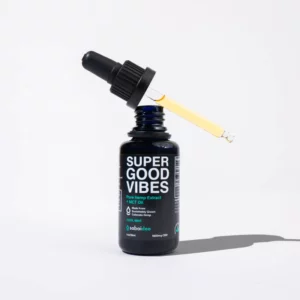
Highest Potency Overview
High potency CBD oils are ideal for those seeking a powerful, therapeutic effect. However, many companies only offer CBD oil in low to moderate potencies. Our pick for the highest potency CBD oil is Sabaidee’s Mega Good Vibes 2500mg+ CBD oil. At 88.33mg of CBD per serving, this is one of the most potent CBD oils on the market. And at $0.08 per mg of CBD, it is also reasonably priced. One 30mL bottle packs 2,500 mg of high-quality, full-spectrum, peppermint-flavored CBD oil.
Sabaidee’s high potency CBD oil is made with just four simple, natural ingredients: CBD-rich hemp extract oil, MCT oil from coconuts, peppermint oil, and stevia leaf extract. The peppermint and stevia give this CBD oil a sweet and minty taste that’s not overpowering. Each product batch is tested by an independent third-party laboratory for purity and potency. And if you like the sound of Sabaidee’s CBD oil but are looking for a lower potency option, low and moderate potencies (8.33mg and 33.5mg per serving respectively) are also available.
4. Best Value – Fab CBD
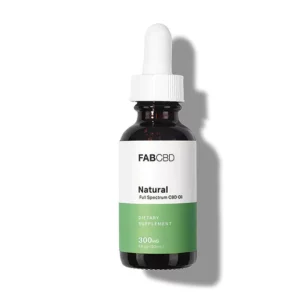
Best Value Overview
Our pick for Best Value is Fab CBD, a brand that offers high-quality CBD products at a reasonable price. The company’s CBD oil is available in four concentrations, ranging from 300mg to 1,500mg, which makes the oil suitable for a range of different consumers. The oil is available in natural, mint, and citrus flavors; prices range from 5 to 11 cents per mg, depending on the concentration. Fab CBD also offers edible gummies and a CBD topical oil.
Fab CBD offers full refunds for all products returned within 30 days of the original purchase. Inexpensive shipping rates are also available; most customers receive their delivery within seven or fewer business days. Customers can contact Fab CBD by phone or email if they have questions or concerns about their delivery. Those who join the brand’s online community qualify for product discounts, as well.
5. Highest Quality – Superfine
Highest Quality Overview
Superfine CBD is most distinguished by the simplicity of their product. Opting for quality over quantity, the only product they sell is their full-spectrum CBD tincture. Even further, this product consists of only two ingredients: CBD hemp oil and hemp seed oil containing vitamins and omega-3 fatty acids. In an industry with no shortage of novelties and gimmicks, some would consider this minimalist approach to be Superfine’s greatest asset.
Superfine CBD is full spectrum, meaning it contains a range of other cannabinoids that combine to produce an effect that’s widely recognized to enhance the effect of pure CBD. The tincture comes in two doses, 250 mg and 750 mg. The company only sources organic, US-grown ingredients, and the product is made in an FDA registered facility and then subject to third-party testing. Superfine ships to all 50 US states. Additionally, they will fully refund your order within 30 days if you are not completely satisfied.
6. Widest Product Selection – CBDistillery Oil
Best Value Overview
Our Best Value pick is CBDistillery, which offers a full spectrum CBD oil containing naturally occurring cannabinoids and terpenes, along with fatty acid Omega 3, B complex vitamins, and 20 essential amino acids. The oil is derived from non-GMO, U.S.-grown hemp. It also contains trace amounts of fractionated coconut oil for subtle flavoring. All product information and third-party testing results are found on the official CBDistillery product page.
This oil is available in concentrations ranging from 250mg to 5,000mg. Prices fall between $0.05 and $0.08 per mg, making the product very inexpensive compared to similar oils and tinctures from other brands. Customers who order the drops directly from CBDistillery may return the product for a full refund. Free shipping is available for U.S. orders of $75 or more.
7. Best Customer Service – PlusCBD Oil
Best Customer Service Overview
Our pick for ‘Best Customer Service’ are the CBD oil drops from PlusCBD Oil. As one of the first companies to develop CBD products in the United States, they are one of the most impactful voices in hemp advocacy and occupy more retail space than anyone else out there. Since their founding, they’ve consistently held a reputation for excellent customer service.
This tincture is processed using the brand’s signature ‘Gold Formula,’ a full spectrum blend of terpenes, phytocannabinoids, fatty acids, and vitamin E. The drops are offered in three concentrations: 250mg in a 1-oz. container, or 750mg and 1,500mg in 2-oz. containers. Plus CBD Oil recommends taking half a dropper, or 15 drops, per dose. The drops are vegetarian-friendly and free of GMOs, gluten, and glycerin.
In addition to an unflavored option, the drops also come in peppermint and goji berry flavors that are perfect for mixing with beverages. The nutritional information for all three flavors is found on the PlusCBD Oil website. The drops are fairly inexpensive, priced at $0.15 per mg or lower depending on the concentration. The brand offers fast shipping throughout the U.S. and to a wide range of international destinations.
Buying Guide – Shopping for the Best CBD Oils
Cannabidiol, or CBD for short, is a natural phyto-cannabinoid (or plant-based chemical compound) found in cannabis plants, including hemp and marijuana. Unlike other cannabinoids — namely tetrahydrocannabinol, or THC — CBD does not produce any psychoactive effects, and will actually counteract these effects to a degree. CBD will induce feelings of sleepiness; for this reason, it can be an effective soporific for people who struggle to fall and/or remain asleep due to insomnia and other sleep disorders.
CBD can enter the body in many ways, including as an oil extract. This informational buyer’s guide will discuss how CBD oils help induce sleep in users, explore safety and legal concerns associated with these products, and share some tips for first-time buyers.
Please note: CBD oil derived from marijuana is subject to stricter state and federal laws than oil derived from hemp. As a result, the former is more difficult to legally obtain in certain parts of the U.S. than the latter. For this reason, our recommendations in this guide exclusively focus on hemp-based CBD oils.
What is CBD Oil?
First, a disclaimer: While we at Tuck.com strive to provide information that will make our readers sleep better, our guides should never replace the recommendations of a licensed physician. Before trying CBD oil for the first time, please consult your doctor to ensure this product is right for you.
CBD is naturally occurring, and is among the largest cannabinoids found in hemp and marijuana. Some studies have revealed that CBD represents more than 40% of the hemp plant’s extract.
The human body also produces cannabinoids, known as endocannabinoids, in a bodily system known as the endocannabinoid system (or ECS). The ECS promotes homeostasis by regulating a wide range of functions, including motor skills, mood, appetite, and sleep. As we age, our ECS produces fewer endocannabinoids; they may also decrease due to physical injury or disease. Replenishing depleted endocannabinoids with phytocannabinoids like CBD can help restore balance to the body.
As a rule, CBD oil extracted from hemp will contain no more than 0.3% THC and have no psychoactive effects; when extracted from cannabis, CBD oil may contain as much as 30% THC — and carry potentially strong psychoactive effects.
CBD oils extracted from hemp generally fall into one of the following categories:
| CBD Class | Extraction Method | THC Content | Appearance | Drug Test Risk? |
| Crystalline Isolate | Oil is extracted from cannabis plant, then allowed to cool; this isolates the CBD from other cannabinoids. The oil forms crystals and is crushed into a powder. | None | White and twinkly | No |
| Full Spectrum Oil | Oil is extracted from the cannabis plant. Oil is not cooled, allowing it to retain THC and other cannabinoids | 0.3% or less | Yellow and translucent | Yes |
How to Use CBD Oil
CBD oil can be consumed in several different ways. These include:
- Capsule: CBD oils may be manufactured as small capsules that are orally ingested.
- Tincture: Another form of oral CBD oil ingestion is the tincture, often used as a food additive. Tinctures are sold in dropper bottles; most users place one or two drops beneath their tongue for several minutes in order to experience the full effects. Tinctures normally have stronger concentrations compared to other CBD products.
- Vapor: CBD vapor (also known as ‘vape’ or ‘vape juice’) is heated and inhaled using a vaporizer pen or e-cigarette. Concentrations vary.
- Spray: CBD oil can be ingested as an oral spray. Sprays tend to have lower concentrations compared to other CBD products.
- Topical: This form of CBD oil is applied directly to the skin; it usually has the consistency of lotion.
CBD oil may be unscented (‘natural’) or manufactured in different flavors, such as peppermint, vanilla, lavender, and cinnamon.
The vast majority of CBD oils come in bottles measuring either 15 milliliters (mL), or 0.5 ounces; or 30 mL, or 1 ounce. However, CBD concentration is more important than bottle size. Concentration refers to the ratio of hemp oil solution (measured in mL) compared to the amount of CBD cannabinoid (measured in milligrams, or mg). A 15-mL bottle may contain 100 mg of CBD, 300 mg, 500 mg, or more. The higher the mg amount, the stronger the CBD oil will be. For this reason, the ‘mg’ measurement is also referred to as the oil’s strength; i.e., 400-mg oil might be called 400-strength oil.
How much CBD oil you should take largely depends on your bodyweight, as well as the desired effects. The next table breaks down the effects of different doses based on these two factors. Always consult your physician to determine the best dosage for you.
| Weight Group | Optimal Dose for Mild Effects | Optimal Dose for Moderate Effects | Optimal Dose for Strong Effects |
| Less than 130 lbs. | 11mg or less | 12mg to 14mg | 15mg to 17mg |
| 130 to 230 lbs. | 18mg or less | 19mg to 23mg | 24mg to 27mg |
| More than 230 lbs. | 23mg or less | 24mg to 30mg | 31mg to 45mg |
Benefits of Using CBD Oil
CBD oil is purported to help to alleviate physical pain and anxiety – both of which can have a negative impact on sleep. Additionally, some users claim that CBD oil prolongs sleep, leading to more rest from night to night. Most medical experts agree that marijuana is not particularly beneficial for individuals with medical conditions and/or mental health disorders, as the THC can increase their symptoms. More research needs to be done but currently CBD companies and users believe CBD to be a viable alternative option for people suffering from the following ailments:
- Insomnia
- REM Behavior Disorder
- Depression and Anxiety
- Chronic Pain
- Epilepsy
However, please note that the medicinal effects of CBD oil have not been studied extensively. While many medical patients claim the oils improve sleep quality and duration, more clinical trials are needed to determine how and why these improvements occur – and if they are applicable to all individuals.
Additionally, CBD oil is also associated with some negative side effects. In the next section, we’ll look at some health risks associated with CBD oil.
Are CBD Oils Safe?
CBD oil is considered therapeutic and low-risk for most users. However, CBD oil may result in the following adverse effects:
- Dry Mouth: As is the case with many other hemp- and marijuana-based products, CBD oil often leads to a condition known as dry mouth (or cottonmouth). This is likely due to cannabinoids altering receptors in the lower jaw that trigger salivation. In most cases, mild discomfort and stronger-than-average thirst are the only issues associated with dry mouth.
- Decreased Blood Pressure: CBD oil may incite a small drop in blood pressure immediately after it is consumed; this may also cause the user to feel lightheaded. These effects typically wear off within hours, although people who take prescription medication should check with their doctor to ensure the oil won’t counteract the effects of other drugs.
- Diarrhea: Diarrhea is a common side effect for people who take relatively large doses of CBD oil, and is linked to the substance interacting with the digestive system. Lowering oil doses often minimizes this effect.
- Changes in Appetite: CBD oil may make users feel hungrier than usual, which is a common effect of most cannabinoids.
Lastly, as we’ve discussed, CBD oil tends to make users feel excessively tired or drowsy. This may be the desired effect. However, it’s important to note that operating a vehicle or heavy machinery after taking CBD oil — especially higher doses — can increase one’s risk of being involved in an accident.
Is CBD Oil Legal?
In recent years, the legality of CBD oil and other products derived from hemp or marijuana has been a hot-button issue.
Historically, hemp could legally be grown and cultivated for academic research purposes only. However, the legality of hemp growth has changed in the past year. In April 2018, Sen. Mitch McConnell of Kentucky introduced the Hemp Farming Act of 2018, a piece of legislation that proposed legalizing all hemp products at the federal level. The act was incorporated in the 2018 United States Farm Bill, which passed in both the House and Senate in December 2018. Per the farm bill, industrial hemp will be descheduled as a federally controlled substance.
Still, the legality of marijuana-based CBD oil also varies from state to state. The table below lists general guidelines for hemp- and marijuana-based CBD oil consumption based on different state laws.
| General Description of Law | States Where Applicable |
| Hemp-based CBD oil is legal to buy, possess and consume for all. Marijuana-based CBD oil is legal to buy, possess, and consume for adults 21 and over and approved minors. | Alaska, California, Colorado, District of Columbia, Maine, Massachusetts, Nevada, Oregon, Vermont, Washington |
| Hemp-based CBD oil is legal to buy, possess and consume for all. Marijuana-based CBD oil is legal to buy, possess, and consume recreationally for adults 21 and over and approved minors; medical marijuana patients must be approved. | Arkansas |
| Hemp-based CBD oil is legal to buy, possess and consume for all. Marijuana-based CBD oil is illegal to use recreationally, but can be used by medical patients with certain conditions; no THC amount restrictions. | Alabama, Arizona, Connecticut, Hawaii, Illinois, Louisiana, Maryland, Michigan, Minnesota, Montana, New Jersey, New Mexico, North Dakota, Ohio, Oklahoma, Pennsylvania, Virginia, West Virginia, Wisconsin |
| Hemp-based CBD oil is legal to buy, possess and consume for all. Marijuana-based CBD oil is illegal to use recreationally, and can only be used medically if the oil meets certain THC restrictions. | Delaware (less than 7% THC) Florida (less than 0.8% THC) Georgia (less than 5% THC) Indiana (less than 0.3% THC) Iowa (3% or less THC) Kansas (must be 0% THC) Missouri (less than 0.3% THC) North Carolina (less than 0.3% THC) South Carolina (less than 0.9% THC) Tennessee (less than 0.9% THC) Texas (less than 0.5% THC) Utah (less than 0.3% THC) Wyoming (less than 0.3% THC) |
| Hemp-based CBD oil is legal to buy, possess and consume for all. Marijuana-based CBD is illegal to consume recreationally, but is legally available to medical patients with a state-registered ID. | New Hampshire, New York, Rhode Island |
This leaves five states remaining. These states have more complex laws pertaining to hemp- and marijuana-based CBD oils.
- Idaho: Marijuana-based CBD oils are illegal to use recreationally or for medical reasons. The state senate recently introduced legislation that would legalize CBD oil, but the governor struck down this motion. This leaves Idaho’s legal status of hemp-based CBD in limbo at this time.
- Kentucky: Marijuana-based CBD oil is illegal to use recreationally, but is available to medical patients participating in a clinical trial. Hemp-based CBD is legal.
- Mississippi: Marijuana-based CBD oil is illegal to use recreationally, but is legal for research purposes when used to treat epilepsy.
- Nebraska: Marijuana- and hemp-based CBD is exclusively available to medical patients participating in clinical trials.
- South Dakota: In South Dakota, CBD has been legally disassociated from other marijuana products. It is available to use recreationally and for medical purposes, provided the product meets FDA approval.
Lastly, it’s important to note that two states planned to vote on marijuana-oriented initiatives during the 2018 midterm elections. These initiatives may have a bearing on the legality and availability of CBD oils.
- Michigan: If passed, the Michigan Marijuana Legislation Initiative would legalize recreational and medical marijuana use for all adults over the age of 21. This measure was approved.
- Utah: If passed, Utah Proposition 2, Medical Marijuana Initiative would legalize the use of marijuana for individuals with qualifying medical illnesses. The initiative was approved. In December 2018, the Utah State Legislature voted to replace Proposition 2; the replacement has been sent to the Utah State Senate.
Three other states, Arizona, Missouri, and Nebraska, failed to garner enough votes to place marijuana initiatives on the 2018 ballots.
These laws are ever-changing, and the guidelines listed above should not substitute for legal advice. Before attempting to purchase marijuana- or hemp-based CBD oil, please review the laws in your state and, if still unclear, contact your attorney and/or state and legal representatives for more information.
Where Can You Buy CBD Oil?
When purchasing hemp-derived CBD oil for sleep, you may be able to find products through one or more of the following establishments:
- Manufacturers: Most brands that make CBD oil allow customers to purchase products directly from them. Their websites have online shopping areas where products can be bought and ordered.
- Online Retailers: Most CBD oils are sold through online retailers. These establishments tend to have the widest product range, and many offer free doorstep delivery. Online retailers also frequently post product reviews, allowing buyers to compare different oils based on customer experiences to determine which is best for them. These reviews can also be used to evaluate the retailer based on customer service, delivery, and product quality.
- Physical Stores: Hemp-based CBD oils are often sold over the counter at certain brick-and-mortar establishments, including health supplement stores and head shops. Physical stores give buyers the full customer experience, and service staff can often provide helpful recommendations.
- Dispensaries: In states where marijuana is legal for recreational use, dispensaries are a common sight. They are much rarer in states with more restrictions. In states that permit the use of medical marijuana, hemp-based CBD oils do not normally require a prescription but marijuana-based oils do. Like brick-and-mortar locations, dispensaries offer more customer service. However, as noted, this may not be an option depending on the buyer’s state of residence. Also, CBD oil prices tend to be significantly higher at dispensaries.
Cost is another consideration. Most CBD oils are sold in concentrations of 300 to 750 mg, although this may range from less than 100 mg to more than 2,000. A good indicator of price-point is the cost per milligram. Low-cost CBD oils usually fall between five and 10 cents per mg; mid-range prices are 11 to 15 cents per mg; and higher-end oils cost 16 cents per mg or higher. Given these varying per-milligram costs, a bottle of CBD oil may be priced anywhere from $10 or less to $150 or more.
How to Find High-Quality CBD Oil
Although price may be an indicator of CBD oil quality, we suggest researching the following factors to ensure the oil you select is considered high-quality.
- Extraction: The method by which CBD oil is processed from hemp plants can be very telling. Some manufacturers extract and process the oil using toxic materials like propane or butane; in most cases, these oils are cheaply priced. Safer extraction and processing agents include ethanol, which cleans the hemp plant of unwanted toxins; and supercritical carbon dioxide extraction, which strips harmful materials from the plant by changing the carbon dioxide’s temperature and pressure settings.
- Where the Hemp is Grown: Like other crops, hemp plants may become contaminated with metals, minerals, and other materials found in the soil where they are grown. Consumers should learn more about farms where hemp plants are grown – and ensure the soils used at these establishments are free of harmful contaminants.
- Third-Party Testing: Once a CBD oil is manufactured, CBD oil companies will often submit their products for third-party tests, which are conducted by non-company personnel to ensure the product is safe for public consumption and meets quality standards.CBD oils should always be accompanied with information about third-party tests; best practice is to avoid oils that do not supply these details.
- Lab Results: These fine-print details are often included with CBD oils to back up third-party testing claims. General rule of thumb: while the results may be indecipherable to laypeople, oils that include lab results are generally better than those that do not list this information.
It’s also important to select CBD oil products based on your concentration preferences. Some forms of CBD oil – such as vapors and tinctures – normally have higher-than-average concentrations, whereas sprays and topicals tend to have lower concentrations. Remember: higher concentration means more pronounced effects, but not necessarily mean higher quality.
Common Ways to Take CBD
One of the best parts of CBD is that it can be infused into practically anything. As a result, there are a variety of ways to take it, each having their own benefits and drawbacks.
Tincture
Tincture, which is the form featured in the top picks of this article, is the most common way of intaking CBD. Tincture is generally a simple formulation of CBD extract and couple other ingredients, usually hemp oil and/or coconut oil. If the tincture is flavored, there may be more ingredients added for flavor. Tincture is generally taken orally using the dropper that comes with the tincture bottle.
Tincture is a great way to get the best bang for your buck, and can be used to infuse cbd in other things such as tea or food.
Topicals
Another popular way to intake CBD is through topicals on the skin. Topical CBD products include pain relief cream, moisturizer, face masks, massage oil and more. This is a popular option for those seeking relief from pain on a specific part of the body. Many cbd topicals include other ingredients relevant to their purpose. For example, CBD pain relief creams may contain other anti-inflammatory ingredients such as menthol.
Capsules and Soft Gels
Capsules and soft gels are an easy, discrete way to take CBD. These often come in gelatin capsules and encasements.
Edibles
CBD can be infused within a variety of foods, the most common being gummies. This means of intake represents an enjoyable way to ingest CBD, with tons of fun and delicious products on the market. Make sure to read the nutritional labels on CBD edibles to get a full picture of what exactly you’re taking.
Vaping
Vaping is another one of the most common ways to take CBD. Oftentimes, brands will sell CBD vapes along with disposable “cartridges” containing a variety of different flavors. Some manufacturers sell disposable vapes, which are thrown away after use. Due to the lack of long-term research on the potential health effects of vaping, we do not recommend this method.
Smoking
Finally, CBD is sometimes ingested in the form of smoking CBD rich hemp or cannabis plant. Pure CBD hemp plant is often sold in the form of pre-rolls. Alternatively. some users smoke cannabis that’s been grown to have significant amounts of CBD, yet this method also involves the ingestion of THC, causing psychoactive effects.
Important Considerations for CBD Oil Shoppers
When buying CBD oil for the first time and comparing different products, here are a few variables to keep in mind:
What is Your CBD Oil Budget?
As noted in the previous section, CBD oil prices vary significantly by brand. The best practice for most is to determine a per-milligram budget for CBD oil, as well as a maximum price for the entire bottle. For example, you might decide that 10 cents per milligram or less is a reasonable budget; and that $45 (for a 450-mg concentration, based on the budget) is a maximum bottle price. Also, if ordering online, be sure to include potential shipping costs.
How Much Do You Weigh?
Weight plays a role in the effects of CBD oil, and bottle size should be selected based on how much you weigh. Let’s say you weigh less than 130 pounds and desire light CBD oil effects; this means that 11 mg or less will probably suffice per dose, giving roughly 40 doses from a 450-mg concentration. If you weigh more than 230 pounds and desire strong effects, then this same concentration will supply roughly 10 doses.
In Which State Do You Currently Reside?
It’s important to consider state laws when comparing different CBD oil options. Please read more about it in the section above section titled “is cbd oil legal?”.
Do You Have a Job with Drug Testing Requirements?
If the answer is yes, then full spectrum CBD oils may not be a feasible option due to their THC content; although these oils contain trace amounts of THC, this may lead to a failed drug test. Crystalline isolate oils, on the other hand, contain no THC and will not compromise drug tests in any way.
Do You Take Prescription Blood Thinners?
If yes, please be aware that CBD oil can cause a slight decrease in blood pressure, which may affect people who take blood thinners.
Does the CBD oil You’re Considering List Third-Party Testing and Lab Result Details?
Third-party testing information is vital for consumers; any CBD oils that do not supply these details should be avoided. Lab results are not as crucial, but may indicate a higher-quality product if they are included.
Do You Prefer to Buy CBD Oil in a Store or Online?
Both online and brick-and-mortar experiences carry pros and cons for CBD oil shoppers. However, it’s important to note that online sales will be the only feasible option in many states.
What Are Your Flavor Preferences?
In addition to natural, unscented CBD oils, many oils come in different flavors. This factor boils down to personal preference — although the flavor selection will be broader with some brands than others.
CBD Oil FAQ
How Do I Find the Best CBD Oil?
The following things are important when deciding which CBD oil you should purchase: extraction method, plant genetics and where the hemp is grown, and lab testing. Price is absolutely a factor as well but make sure you know that what you’re getting is high quality and tested – i.e. it really is what it says it is!
Also, consider the concentration and type of CBD oil. If you are weary of THC, go with a broad spectrum or an isolate product. If you don’t know what dosage makes sense for you, check out our dosage guide and start with a lower concentration.
What Are The Differences Between Full Spectrum, Broad Spectrum, and Isolate CBD Products?
Full spectrum products contain trace amount of THC (less than .3%) as well as the full suite of cannabinoids that come from the hemp plant.
Broad spectrum products contain other cannabinoids and terpenes but no THC.
Isolate products only contain CBD and no other cannabinoids and/or terpenes.
How Much Does CBD Oil Cost?
CBD Oil can cost as little as $.05 per milligram and as much as over $.30 per miligram depending on the type of oil you’re interested in purchasing.

